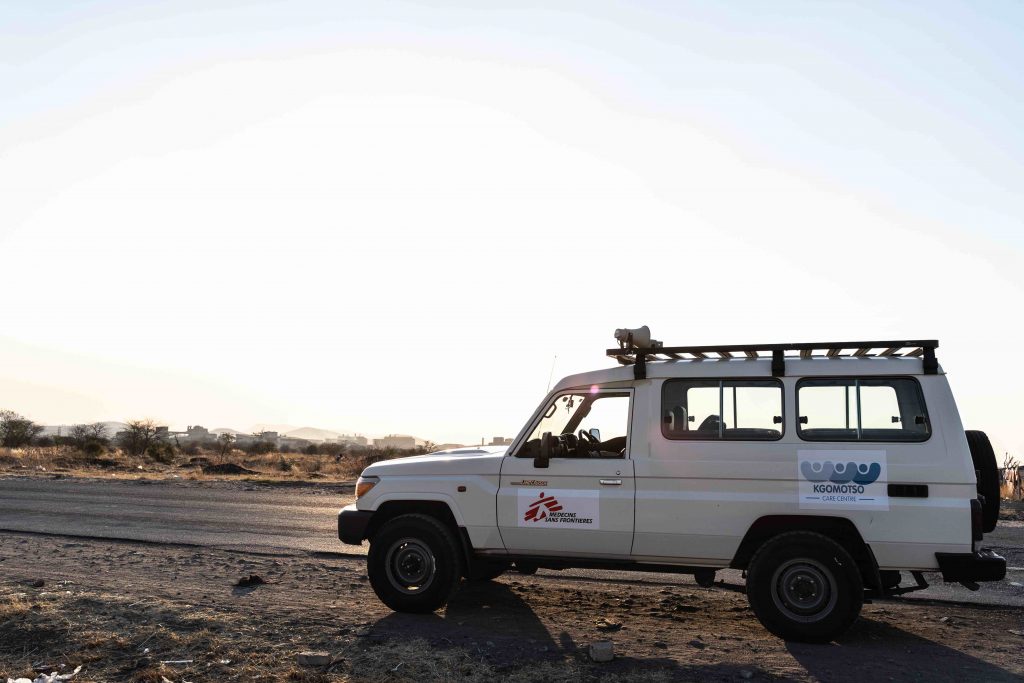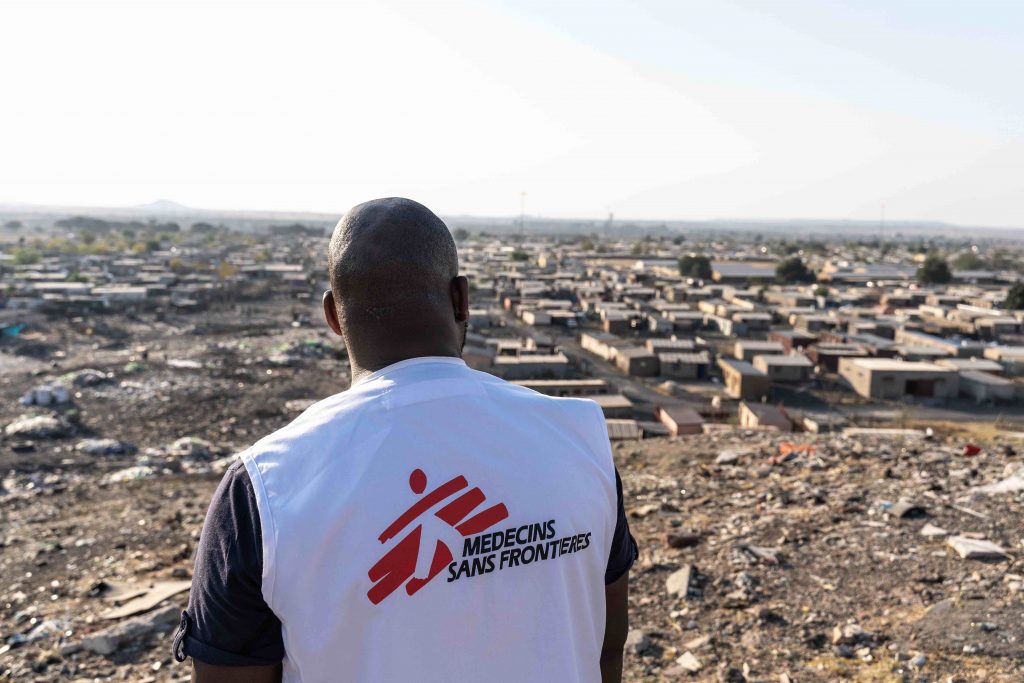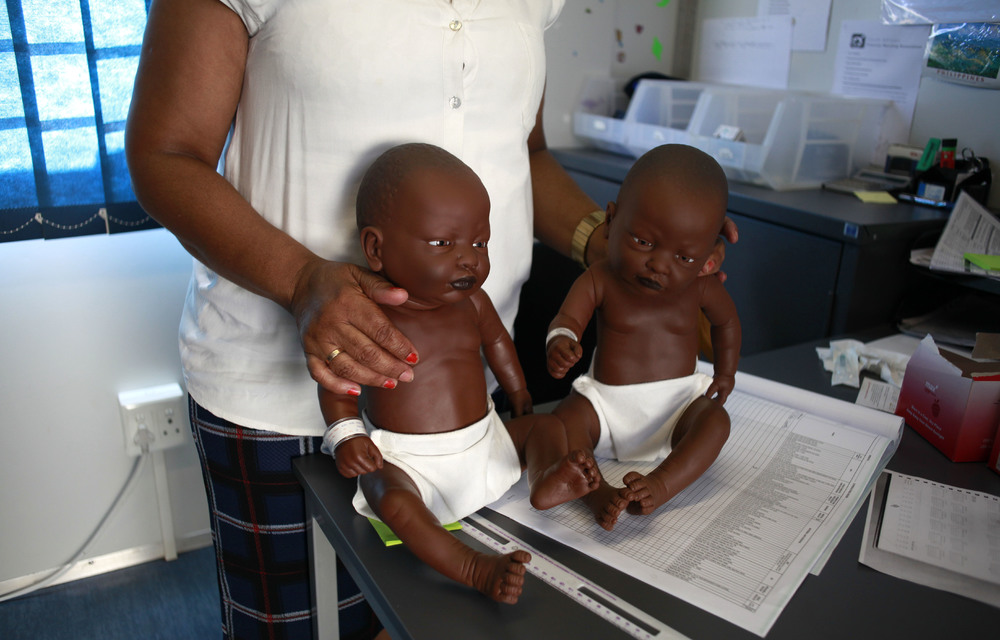Floods, fires and war — for decades, first responders have been using this mental health hack to help people after disasters hit. Could it work for survivors of sexual and gender-based violence too?
COMMENT
The white 4×4 Fortuners’ engine roars to life before Lebogang Seketema puts the car into gear. He sets off down a wide, four-lane street in the mining town of Rustenburg.
Seketema passes petrol stations and shops before turning to pass a primary school on his right; its long one-story face brick classrooms roll past in the window as he drives by.
He glances towards the school, before shifting his focus back onto the road.
“This is the primary school where I once picked up a nine-year-old girl,” Seketema says. “She had been raped by her stepfather.”

For the last three years, Seketema has worked as a driver for the international humanitarian organisation, Doctors Without Borders (MSF) in Rustenburg. Here, one out of every four women in the local municipality have been raped at some point in their lives, a 2016 MSF household survey found.
That means an estimated 11 000 women and girls are raped annually in this area alone.
Yet only 5% of women in the study had ever reported their rape to a healthcare worker.
- Read more: South Africa’s national HIV plan aims to provide all survivors of sexual assaults with post-exposure prophylaxis to prevent HIV infection
Every day, Seketema and other MSF drivers fetch survivors of sexual violence from all around the mining community. Some they collect from spots in town; others from amid the sprawling informal settlements that have sprung up around the area’s platinum mines. The drivers bring them to MSF’s Kgomotso Care Centres (KCCs), which the organisation runs in partnership with the North West health department.
Each of the three centres is staffed with a multidisciplinary team of forensic nurses, registered counsellors and social workers who offer people immediate care for their injuries, medication to prevent HIV and pregnancy as well as psychological support. Based at community healthcare centres, this team refers survivors for further treatment at local hospitals, acute psychological care or to legal resources. In this way, survivors are cared for through a network of partnerships and community-based resources that facilitate advanced and longer-term services for their recovery.
In 2017, more than half of the survivors who came through the doors of these specialised clinics lived at least an hours’ walk from one of these facilities, and one in 10 travelled more than 30 kilometres, according to an MSF report.
Extreme levels of sexual violence are probably linked to high levels of depression among women found in the community, MSF argued in a follow-up 2017 report.
“Traveling long distances to reach services [is] unfeasible for many people around Rustenburg,” researchers noted.

But the distance between victims of sexual violence and care isn’t just confined to the country’s Platinum Belt.
The national department of health has 256 public health facilities — mostly hospitals — designated to provide medical and psychological care to survivors of sexual violence. Among these are 55 Thuthuzela Care Centres (TCC) — one-stop centres where victims can receive medical care and legal help in opening a criminal case, if they choose to do so. But studies in both 2017 and 2018 found that a lack of transport to and from TCCs not only prevents people from reporting initial violence but also from getting follow up care.
In Rustenburg, drivers such as Seketema are helping to bridge that gap. They’re also the first people many survivors will meet after an attack.
“When I took the job, I thought I’m going to only drive — collect the patient, drop them at the centre and then take them back home,” Seketema explains. “But then I realised that it’s more than that.”
“I have to be emotionally invested in this because if someone comes in crying telling you what happened to them, you have to listen,” he says. “No matter how it hurts, you have to listen, you have to comfort them.”
And listening is a crucial part of the job description. Each one of MSF’s drivers have been trained to provide what’s known as psychological first aid.
It’s a concept that arose more than half a century ago in response to natural disasters or the outbreak of war, which is why many leading international humanitarian groups were early adopters of the practice.
The premise is simple: The first people we meet after a traumatic event can do the most good if they help victims feel safe and respected.
It starts with listening to people, but not pressuring them to talk. The best part? You don’t need a fancy degree to do it; just some basic training.
Although psychological first aid can’t replace therapy, it can help reduce victims’ stress in the immediate aftermath of a crisis. It can be used to help refer people who need more formal counselling, a 2012 research review published in the journal, Disaster Medicine and Public Health Preparedness, found.
The 2012 study, as well as a 2009 WHO review, showed that even though more rigorous research was needed to provide a stronger evidence base for guidelines, there was enough evidence to back the concept’s broader use within the humanitarian field.
By 2013, psychological first aid had also made its way into the body’s international guidelines for treating sexual and gender-based violence, although several studies still cite the need for more research into this kind of care — most pre-hospital mental health services, for instance, remain under studied, researchers noted in a 2014 review published in the journal PLoS One.
Seketema and the other MSF drivers working on rotation put their skills to the test every day. The key? Making women feel safe, particularly in the presence of a man.
“You can imagine, I’m a man, and the lady that I am picking up has been abused by a man,” he explains.” As a driver, you have to let her know that she’s in a safe place — that she’s safe with you.”

As a teenager, Seketema’s own sister was raped when she was not much older than the child he collected that day from the face brick primary school. She never got counselling, he says, and to this day she lives with that pain.
He says: “Sometimes even when I’m speaking to her she tries to block that memory from her mind…but I know that that thing is still there like it is [with] me now.”
In the first year that MSF launched its Kgomotso Care Centre model in Boitekong, about half the patients that came through its doors were under the age of 18.
In 2017, the humanitarian organisation called each of the country’s 265 health facilities designated to offer care for survivors of sexual and gender-based violence. Almost a quarter of the 135 clinics and hospitals that responded admitted they provided no trauma counselling for victims or had no healthcare worker on-site capable of providing mental health counselling, the survey revealed.
More than a third of facilities did not screen victims for risk of suicide or provide counselling for children.
Victims of sexual and gender-based violence deserve more. As MSF, we’re now calling for each of these 265 designated facilities to ensure they offer counselling seven days a week, 24 hours a day, in addition to the medical care they need. Screening for conditions such as major depression, post-traumatic stress and risk of suicide should also be standardised across the country.
Back in Rustenburg, Poppy Makgobatlou is finally free.
She suffered the wrath of an abusive husband for years. When she recalls that time, she can still hear the crack of her shoulder as her now ex-husband broke it in two, throwing her against a wall one night.
“I thought, you know, maybe it was a mistake, and he would never repeat it,” Makgobatlou says. “But I was lying to myself.”
Then one day, she decided to get help and called MSF’s 24-hour hotline. Sure enough, soon a white van came down the road with a driver just like Seketema behind the wheel.
“I was crying,” Makgobatlou remembers. “Then he said to me, ‘I don’t know how much pain you feel. I cannot tell you it’s going to be okay because I don’t know how long you’ve been living like this but what I can tell you is just try to be strong.'”
Kate Ribet is a communications advisor with Doctors Without Borders (MSF).
